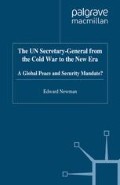Abstract
The post-Cold War Secretaryship-General has reflected a number of constraints and opportunities. There is an air of transition at the UN as the Organization adjusts to the systemic changes and challenges of international relations, and especially the wider concept of peace and security. The complexion of global economic and political-military power likewise remains in transition. In addition, the UN continues to be buffeted by uncertainty both in terms of its role and the support of its chief sponsors. In the context of this, a post-Cold War ‘model’ of the Office of Secretary-General may be illusory as it continues to reflect a tumultuous international environment. In fact, there has been a multifaceted and, perhaps, paradoxical evolution of the Secretaryship-General. Thus, while there have been opportunities for the Office as an extension of the blossoming of UN activity, the Secretaryship-General has encountered constraints, frustration and precariousness. These trends will be examined in the next two chapters. The following are the themes which were reflected in the Secretaryship-General under BoutrosGhali’s tenure:
-
The UN as an instrument of activist states and a directorate within the Security Council. The predominance, although not necessarily leadership, of the US.
-
The absence of direction of the international community and an element of transition.
-
The quantitative increase of the Secretaryship-General’s roles.
-
The redefinition and expansion of UN roles, especially into the domestic context. Experimentation in UN peace operations followed by caution from 1993, especially in the face of state failure, civil war, and fragmentation. The qualitative expansion of the Secretaryship-General as a result of the expansion of new areas of activity, especially within the domestic context.
-
The Secretaryship-General in the context of UN overload and financial crisis.
-
The Secretaryship-General in relation to the explosion of resolutions alluding to, or under, Chapter VII, and resolutions sometimes not supported in practice.
-
The movement of peace operations and multilateralism towards the use of force or coercion.
-
UN support for, or legitimization of, regional peacekeeping.
-
Volatility of members’ support for UN operations, fatigue in multilateralism, and political prioritization in Security Council’s decision-making and resource allocation.
-
The lack of Great Power interest from many UN involvements, in contrast to the successes of 1988–92.
-
The Secretary-General expressing frustration toward missed/lost opportunities and dashed expectations; attempting to wield declaratory leverage to lead the Organization into a wider conception of governance and wider responsibilities, and the implications of this upon the classical roles.
Access this chapter
Tax calculation will be finalised at checkout
Purchases are for personal use only
Preview
Unable to display preview. Download preview PDF.
Notes
B. Boutros-Ghali, An Agenda for Peace. Preventive Diplomacy, Peacemaking and Peace-keeping (New York: United Nations, 1992) paragraph 6.
J.S. Nye Jr, Bound to Lead. The Changing Nature of American Power, (New York: Basic Books, 1990).
J.S. Nye Jr, ‘What New World Order?’ Foreign Affairs, vol. 71, no. 2, 1992, p. 84.
Author information
Authors and Affiliations
Copyright information
© 1998 Edward Newman
About this chapter
Cite this chapter
Newman, E. (1998). Boutros Boutros-Ghali. In: The UN Secretary-General from the Cold War to the New Era. Palgrave Macmillan, London. https://doi.org/10.1057/9780230504547_7
Download citation
DOI: https://doi.org/10.1057/9780230504547_7
Publisher Name: Palgrave Macmillan, London
Print ISBN: 978-1-349-40081-2
Online ISBN: 978-0-230-50454-7
eBook Packages: Palgrave Political & Intern. Studies CollectionPolitical Science and International Studies (R0)

